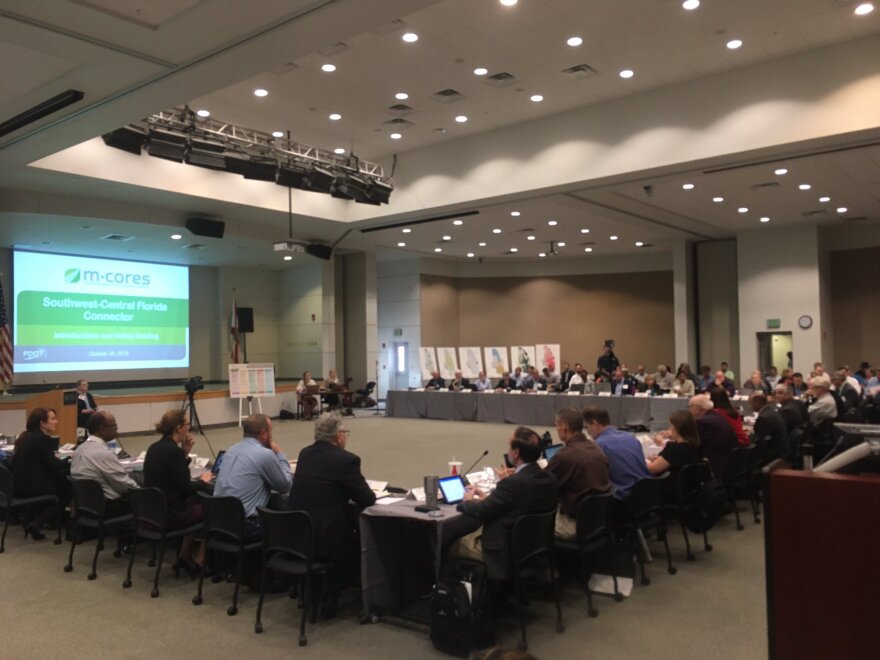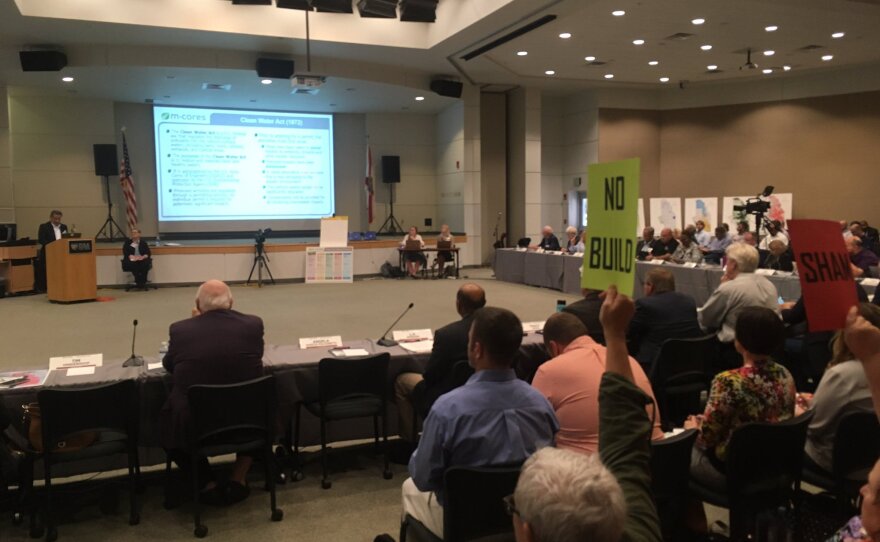Three of the biggest road projects ever proposed in Florida are on a fast track, spurred on by state lawmakers. One of the roads, which would cut through some of the state's most natural areas, is called the Southwest Central Connector.
That much is known.
How much will it cost?
Nobody knows.
What is it's projected revenue?
Nobody knows.
Where exactly will it go?
Somewhere between Polk and Collier counties - possibly in places like the Lake Wales Ridge, a windswept perch of wide-open vistas and very few homes.
Reed Bowman is a biologist at Archbold Biological Station in Highlands County, a preserve for plants and animals that are found nowhere else in the world.
"I think people see the economic benefits of it. I also think that people in this area - partially because Archbold is embedded in the Lake Wales Ridge - understand how important connectivity is," Bowman said. "And I think people here are interested in the ideas of maybe having the road, but making sure that it tries to keep the animal corridors intact. Or investigating some of the potential benefits of things like animal crossovers. Some of the roads that are being widened are incorporating that, like the widening of State Road 70."
So why is the road being built?
It's the idea of State Senate President Bill Galvano. The Bradenton Republican came up with it after talking with business leaders about ways to spur growth in the state's hinterlands. He spoke during the task force's initial meeting in August, saying it would ease congestion and help with hurricane evacuations.
"We also have the opportunity in our planning to revitalize our rural communities - the rural communities that have been the backbone of this state for generations," Galvano said. "It's a wide swath that's in consideration - way beyond just a layout from days past. And with the challenge that this swath needs to help bolster the spine of our state."
What makes this road different is it turns traditional planning on its head. Instead of having road planners determine a need, then plan a route - this time state lawmakers said, we need a road - now go build it.
The bill the Legislature passed gives extraordinarily tight timelines. Three task forces, one for each road, have until October to issue its recommendations to the governor and Legislature. Construction would start in 2022 and the roads would be "substantially completed" by 2030.

The task force is called the Multi-use Corridors of Regional Economic Significance (M-CORES) program.
And the 47-member task force - which is heavily weighted to government and business interests - isn't left with much to consider.
Member Shannon Estenoz of the non-profit Everglades Foundation said even after two meetings, she's still in a bit of a fog.
"I don't have enough information to make - I don't even really know what recommendations we're making," she said during a recent task force meeting in Lakeland. "I think it sounds like we're supposed to be developing guiding principles - I'm not sure I even have enough information to do that."
Estenoz is one of several task force members who have questioned the need for the road in the first place.
"I, as a task force member, cannot at this point give any kind of informed opinion about any of this stuff because I feel like I don’t know enough," she said. "I just feel completely blind."
But it's not their call to make.
L.K. Nandam, the Florida Department of Transporation's regional secretary, told the members they aren’t supposed to determine the need or purpose of the road, but focus on coming up with a consensus recommendation they all can live with.
"Our purpose, per the statute, is to provide recommendations to the department, to the governor and the Legislature, by the report that we're going to deliver next year," he told the task force members. "And those recommendations are going to be focused on the goals and the guiding principals that are going to be used in our planning and project development process."
So what does that mean exactly?
"That's a really good question," said Chris Costello of the Florida Sierra Club, which has spearheaded the campaign against what it calls "Roads to Ruin."
"I mean, if I want to get right down to it," she said, "I think they're tasked with rubber-stamping the bill, the statute. The idea."
Environmentalists argue that the projects would cause harm to undeveloped areas and lead to sprawl.
Nature photographer Carlton Ward Jr. of Tampa recently participated in a seven-day trek on a natural wildlife corridor connecting Polk and Highlands counties. It's in the road's potential pathway.
"The toll road that's proposed is a big concern," Ward said. "We know already that development is coming. It's projected that we're going to lose five million acres of the corridor by 2070 if we don't change course. The toll roads accelerate that pace."
Others are taking a pragmatic note, saying the political momentum to build the road may be unstoppable. Member Paul Gray of Highlands County is with Audubon Florida.
"We know Florida is going to keep developing, but to the extent we can, this road - whatever we come up with," he said, "can help to guide that development toward developed areas, rather than into new areas."
For people like the Sierra Club's Costello, keeping that development away could be like trying to stem the tide.
"This is a sham. A rubber stamp," she said, while distributing anti-road leaflets outside the Lakeland task force meeting. "However, I don't think it's a fait accompli, because I think the Florida public will refuse to accept such damaging toll roads that are unneeded. They will refuse to pay for those roads. So it may take us a year or so, but we will defeat these roads."
But with state lawmakers firmly at the wheel here, the difficulty of changing course may make this a fait accompli.
Upcoming task force events:
Nov 12 · Southwest-Central Florida Connector Community Open House,
5:30 pm – 7:30 pm
Wauchula Train Depot
135 East Main Street
Wauchula
Dec. 9 Southwest-Central Florida Connector Task Force Meeting #3
10 a.m.
LaBelle Civic Center
481 State Road 80
LaBelle
Dec 12, 2019 · Southwest-Central Florida Connector Community Open House
5:30 pm – 7:30 pm
North Collier Park – Exhibit Hall
15000 Livingston Road
Naples










